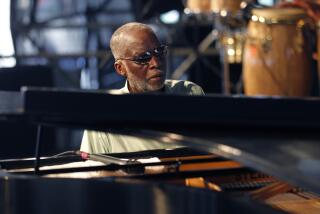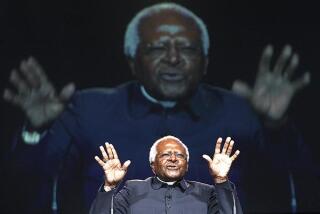Imam’s views created rift with black nationalists
- Share via
Imam W. Deen Mohammed, the rebellious son of the late Nation of Islam leader Elijah Muhammad who broke from black nationalism and guided his followers toward mainstream Islam, died Tuesday, according to family members. He was 74.
“Brother Imam,” as he was known, was pronounced dead at his home in Markham, Ill., according to a spokesman for the Cook County Medical Examiner. An autopsy was planned.
As Muslims marked the holy month of Ramadan, Mohammed was scheduled to speak Tuesday in Chicago, but many grew concerned when he did not appear. His last speaking engagement was his regular monthly address delivered Sunday in Homewood, Ill., and aired to a live radio audience.
“He was a pioneer in the Muslim American community and was one of the first leaders to get Muslims to think about their faith in context of the larger society,” said Rami Nashashibi, executive director of Inner-City Muslim Action Network in Chicago. “He was also a pioneer in getting Muslims to embrace their religious identity at a time when that wasn’t very popular.”
Mohammed succeeded his father in 1975 as leader of the Nation of Islam, a religious movement that melds black nationalism with the Islamic faith. He immediately tried to move its followers toward traditional Islam, eventually leading to a split between those who agreed with Mohammed’s approach and those who joined a revived Nation of Islam under Minister Louis Farrakhan.
“He will be remembered as a person who brought the Nation of Islam carefully and consistently into mainline Islam,” said Yvonne Haddad, a professor of the history of Islam and Christian-Muslim relations at Georgetown University. “Eventually, he’d start talking about American Muslims -- how we can be Muslim and American at the same time.”
In the later years of his life, Mohammed’s profile diminished somewhat. He focused more energy into his nonprofit ministry, the Mosque Cares. He also worked on building interfaith relations, meeting with Pope John Paul II at the Vatican in 1996.
Some saw his lessened visibility as the final steps in his efforts to restructure his organization into a loose group of organizations without a central charismatic figure.
Wallace D. Mohammed was born Oct. 30, 1933, in Detroit, the seventh of eight children of Elijah and Clara Muhammad. (He became known later as Imam Warithuddeen Mohammed.)
His father was a disciple of W.D. Fard, a door-to-door salesman who founded a small sect in that city known alternately as the Lost-Found Nation of Islam and the Allah Temple of Islam. Upon Fard’s mysterious disappearance in 1934, Elijah Muhammad proclaimed Fard to be God, and he announced himself as his Messenger, a divinely inspired prophet.
W. Deen Mohammed was for many years an obedient son. He was the minister of the Nation of Islam’s mosques in Chicago and Philadelphia in the 1950s. On his 28th birthday in 1961, Mohammed was sent to federal prison in Minnesota for refusing, on the basis of Nation of Islam teachings, induction into the U.S. military. While serving his prison sentence, Mohammed reevaluated his father’s preaching.
Expelled from the Nation of Islam for criticizing his father’s sometimes harsh doctrine, Mohammed supported his own family by driving a cab, doing welding, plucking chickens and working as a house painter and junkman.
Mohammed publicly begged his father’s forgiveness. He was readmitted to the movement, only to be expelled several times again. He was finally restored to grace in 1974, only six months before his father’s death.
Farrakhan was expected to succeed Elijah Muhammad. But a closed-door family council chose Mohammed to be the movement’s chief imam. He began preaching a more universal religious message. He also cut back on the group’s commercial empire, saying business ventures distracted the movement from its religious mission.
Mohammed’s changes produced a backlash within the group, which he renamed the World Community of Al-Islam in the West. Subsequently, the name was changed several times again. Of all his innovations, the most costly in terms of lost followers was his rejection of black supremacy.
In 1978, Farrakhan broke with Mohammed and formed his own counter-movement. He revived the name Nation of Islam, saying he intended to follow the teaching of Elijah Muhammad.
Mohammed decentralized power within the movement, making each mosque autonomous. But he reacted impatiently when the other imams didn’t more closely follow his path toward mainstream Islam.
“I have tried over the last 10 to 12 years to encourage them to get more religious education, but I have made no progress,” Mohammed said upon resigning as head of the American Society of Muslims five years ago.
But most observers think the greater number of African American Muslims remained loyal to W. Deen Mohammed than to Farrakhan.
Despite their differences, Mohammed and Farrakhan reconciled in a series of joint appearances starting in 1999 and pledged to work together.
Mohammed also achieved several historic milestones for Muslim Americans. In 1992, he became the first Muslim to deliver an invocation to the U.S. Senate. In 1993 and 1997, he recited from the Koran at President Clinton’s two inaugural interfaith Prayer Services.
Mohammed’s survivors include his wife, Shirley, nine children and several grandchildren.
--
Tribune reporter Trevor Jensen contributed to this report.
More to Read
Sign up for Essential California
The most important California stories and recommendations in your inbox every morning.
You may occasionally receive promotional content from the Los Angeles Times.










